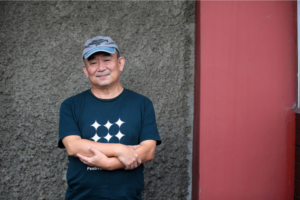
DMZ International Documentary Film Festival
Korean filmmakers are learning about the power of fair use—and also the high cost of not using it, as our report released at the 2024 DMZ International Documentary Film Festival shows.
The study reveals the results of a survey of 185 Korean documentary filmmakers, as well as interviews with 30 of them. Professors Changmin Lee and Emmanuel Moonchil Park collaborated with me on the work, which I was able to do thanks to a Fulbright Senior Research Grant at Hankuk University of Foreign Studies.
Fair Use Comes to Korea.
I wanted to explore copyright and creativity among Korean documentary filmmakers, because a decade before, fair use had become part of Korean law. I had already seen what a huge difference fair use made to the field in the U.S. When Prof. Peter Jaszi and I studied documentary practice on copyright in 2004, fair use was not even part of most documentarians’ thinking. Errors-and-omissions insurers wouldn’t insure for it, broadcasters wouldn’t accept films with fair use, and lawyers pooh-poohed the idea that it was useful. There wasn’t much litigation to learn from, and people just didn’t know what fair use meant in practice.
Filmmakers decided to work together to find the most common and least controversial ways to employ fair use. Amazingly, within a year of publishing their Documentary Filmmakers Statement of Best Practices in Fair Use, documentarians found that every insurer in the U.S. would insure for it, and suddenly they could get distribution. Whole new kinds of films could get made—a story we told in Reclaiming Fair Use: How to Put Balance Back in Copyright.
Can You Export Success?
What happens to fair use in a different setting? My colleagues—both of them also documentary filmmakers—and I set out to map the state of copyright practice among Korean documentarians.
As K-culture (hallyu) burgeons, documentarians are producing both in national and international environments. Copyright has become something they have to pay attention to, although most of them don’t make any money from their copyrights.
Korean copyright law emphasizes the importance of balance—that both copyright protection and limited access to copyrighted works are necessary for Korean culture to flourish. But are documentarians using both sides of the law?
Self-censorship in Documentaries.
What we found surprised and sometimes shocked us. Key takeaways from the report:
- Documentarians universally build third-party, copyrighted materials into their work.
- They are all aware that copyright has to be one of their professional considerations.
- They also say that they know very little about copyright law.
- They do not know about some of the most powerful parts of Korean copyright law for documentarians–especially fair use.
- Among those who do know the legal exceptions exist, very few are actually using them.
- It’s not just their fear and/or lack of knowledge, but also distributors. Filmmakers often face demands for 100% permissioning, to get their films on air, streaming or in theaters.
- There’s very little Korean law about fair use so far, but what there is aligns with U.S. law, which is fair use-friendly.
- As a result of their failure to use the law, filmmakers pay a high price.
- They pay more than they should.
- They take longer than they should, waiting for permissions and raising money to pay them.
- They change their work, faking reality in the process.
- They decide not even to think about doing some kinds of projects.
As one filmmaker told us, “During brainstorming, if the copyright issue is complicated, I often dismiss the idea itself.”
That’s a sad statement. When filmmakers refuse even to imagine projects because of copyright limitations, they are self-censoring.
We learned, as U.S. documentarians had, that fair use needs to be used to be real. When people either don’t know about it, or don’t know how to use it, copyright remains unbalanced. Creativity and free expression suffer.
A Brighter Future.
Copyright is only one of the many challenges Korean documentary filmmakers face. But it is one that U.S. documentarians previously faced, and answered with a best practices code. One of Korea’s judges, who studied fair use and fair dealing extensively, has suggested that such codes could provide crucial help in interpreting fair use in practice.
In the meantime, my collaborators have translated the U.S. documentarians’ code into Korean, as well as other materials, all available here. Learning how U.S. documentary filmmakers employ the exact same law can provide Korean filmmakers some examples of how fair use is crucial to documentary expression once copyright is everywhere.

Dong-won Kim, godfather of Korean documentary film (Credit: Cine21)
The DMZ International Documentary Film Festival’s panel and roundtable discussion is opening up the conversation. Representatives of Korea’s leading filmmaker groups, including the Korea Independent Video and Filmmakers (started by the godfather of Korean documentary film, Dong-won Kim, who will also participate) and Korean Documentary Network, and the leading independent media organization, MediAct, will be brainstorming together there, among others.
My colleagues and I are honored to see our research showcased at Korea’s leading event for documentary filmmaking. And we hope that it is only the beginning of the journey for Korean filmmakers and documentary studies scholars.
